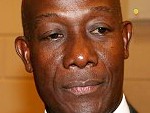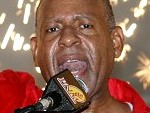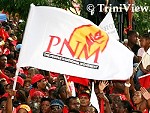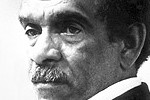By Raffique Shah
April 27, 2008
 If former Trade Minister Dr Keith Rowley is a hooligan who displays ‘wajang’ behaviour, when did these abominable character traits first manifest themselves? Prime Minister Patrick Manning, explaining why he summarily fired the senior minister, told the media that for all of five minutes during a Cabinet committee meeting, Rowley ranted and raved and misbehaved, much to the shock of his colleagues. Pressed by journalists on Rowley’s darker side, Manning said: “It was not the first time. I’ve had to talk with him before.”
If former Trade Minister Dr Keith Rowley is a hooligan who displays ‘wajang’ behaviour, when did these abominable character traits first manifest themselves? Prime Minister Patrick Manning, explaining why he summarily fired the senior minister, told the media that for all of five minutes during a Cabinet committee meeting, Rowley ranted and raved and misbehaved, much to the shock of his colleagues. Pressed by journalists on Rowley’s darker side, Manning said: “It was not the first time. I’ve had to talk with him before.”
Continue reading Manning Shoots a Rowdy Messenger

 At yesterday’s post-cabinet news conference, Prime Minister Patrick Manning appeared alone to explain why he fired Rowley. Manning said that he fired Dr. Keith Rowley because of unacceptable ‘hooligan behaviour’ at a meeting of the Finance and General Purposes Committee of cabinet, and not because of his corruption allegation.
At yesterday’s post-cabinet news conference, Prime Minister Patrick Manning appeared alone to explain why he fired Rowley. Manning said that he fired Dr. Keith Rowley because of unacceptable ‘hooligan behaviour’ at a meeting of the Finance and General Purposes Committee of cabinet, and not because of his corruption allegation. It came as a thunderbolt out of the political sky. A stunned country listened when it learned that Keith Rowley was fired from his position as a minister in Government. The Guardian headlines read: “Fired.” In a note sent to the Guardian after he was seen sitting in the backbench of the Lower House, Rowley wrote: “I have not resigned. I have been fired.”
It came as a thunderbolt out of the political sky. A stunned country listened when it learned that Keith Rowley was fired from his position as a minister in Government. The Guardian headlines read: “Fired.” In a note sent to the Guardian after he was seen sitting in the backbench of the Lower House, Rowley wrote: “I have not resigned. I have been fired.”  Dr. Keith Rowley’s appointment as Trade and Industry Minister was revoked with immediate effect on Wednesday 23rd April, 2008, by President George Maxwell Richards acting on the advice of Prime Minister Patrick Manning. This dismissal comes six months into the term of the Patrick Manning administration and has impassioned many supporters of Rowley.
Dr. Keith Rowley’s appointment as Trade and Industry Minister was revoked with immediate effect on Wednesday 23rd April, 2008, by President George Maxwell Richards acting on the advice of Prime Minister Patrick Manning. This dismissal comes six months into the term of the Patrick Manning administration and has impassioned many supporters of Rowley. THIRTY-EIGHT years ago tomorrow, a group of us comprising young officers in the Trinidad and Tobago Regiment (TTR), along with a few hundred soldiers, etched our names in history by revolting and seizing control of the army’s HQ at Teteron Barracks. We would hold the camp for ten days before subjecting ourselves to being arrested. We were charged with mutiny and treason among other serious offences. Of the 80-odd men arrested, around 40 faced court martial, with 25-or-so being sentenced to various terms of imprisonment. After 27 months in jail, we would walk free, thanks to the judicial system that remained fiercely independent of the political directorate.
THIRTY-EIGHT years ago tomorrow, a group of us comprising young officers in the Trinidad and Tobago Regiment (TTR), along with a few hundred soldiers, etched our names in history by revolting and seizing control of the army’s HQ at Teteron Barracks. We would hold the camp for ten days before subjecting ourselves to being arrested. We were charged with mutiny and treason among other serious offences. Of the 80-odd men arrested, around 40 faced court martial, with 25-or-so being sentenced to various terms of imprisonment. After 27 months in jail, we would walk free, thanks to the judicial system that remained fiercely independent of the political directorate. This critique is in response to an article titled “Judge: Address racism to move ahead” that appeared in The Daily Express (14 April 2008) in which Justice Wendell Kangaloo is reported to have said that “we in Trinidad and Tobago would do well to start a conversation about race” in order to move this country forward.
This critique is in response to an article titled “Judge: Address racism to move ahead” that appeared in The Daily Express (14 April 2008) in which Justice Wendell Kangaloo is reported to have said that “we in Trinidad and Tobago would do well to start a conversation about race” in order to move this country forward. In Omeros, Derek Walcott’s epic poem, Achille, one of the major protagonists, returns to Africa and is welcomed home by Ofolabe, his father. During that visit, Ofolabe learns that Achille changed his African name to a Caribbean name that has little meaning. Hurt by this name change, Afolabe retorts:
In Omeros, Derek Walcott’s epic poem, Achille, one of the major protagonists, returns to Africa and is welcomed home by Ofolabe, his father. During that visit, Ofolabe learns that Achille changed his African name to a Caribbean name that has little meaning. Hurt by this name change, Afolabe retorts: “We have not seen the last of the rising price of rice.” This is the view of president of the Supermarkets Association of T&T (Satt) Heeranand Maharaj.
“We have not seen the last of the rising price of rice.” This is the view of president of the Supermarkets Association of T&T (Satt) Heeranand Maharaj.  BACK in the mid-1970s there was a very vocal minority of “Tobago secessionists” who ranted about the sister-isle being treated like a “bastard”, and who demanded its independence. Dr Winston Murray, one of its two elected MPs, designed a Tobago flag which he proudly displayed on his desk in the Parliament chamber. The secessionist lobby argued, with some justification, that the island was starved of resources, its residents not treated fairly by the central government in Port of Spain.
BACK in the mid-1970s there was a very vocal minority of “Tobago secessionists” who ranted about the sister-isle being treated like a “bastard”, and who demanded its independence. Dr Winston Murray, one of its two elected MPs, designed a Tobago flag which he proudly displayed on his desk in the Parliament chamber. The secessionist lobby argued, with some justification, that the island was starved of resources, its residents not treated fairly by the central government in Port of Spain. OPPOSITION LEADER Basdeo Panday’s legal problems just got a little worse. More than one year after having his political life revitalised by the quashing of a criminal conviction against him, the Privy Council yesterday paved the way for him to face a retrial on three charges of failing to declare a joint London bank account to the Integrity Commission.
OPPOSITION LEADER Basdeo Panday’s legal problems just got a little worse. More than one year after having his political life revitalised by the quashing of a criminal conviction against him, the Privy Council yesterday paved the way for him to face a retrial on three charges of failing to declare a joint London bank account to the Integrity Commission.